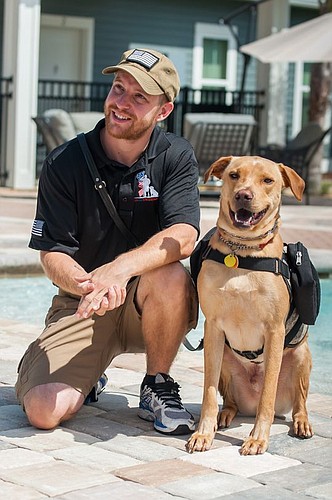
U.S. Navy veteran Matt Masingill was in the early moments of one of his periodic anxiety attacks — and didn’t know it.
But Dozer, his canine companion, did.
It was July 2013 — about two weeks after Masingill and his Labrador-mastiff mix were matched through K9s for Warriors, a St. Johns County-based nonprofit.
The episode at a crowded farmer’s market was an epiphany for the duo. Masingill, 42, has post-traumatic stress disorder after being deployed in Iraq, Kosovo, Somalia and the Indian Ocean.
“Matt kept saying that Dozer was acting up,” says Masingill’s wife, Danique. “I said to Matt, ‘Feel your forehead.’”
He was in a cold sweat.
“That’s when we knew that Dozer knows exactly what is going on with Matt — before Matt knows, himself,” she said.
Shari and Bobby Duval founded K9s for Warriors in 2011 to bring aid and comfort to their son and other U.S. military veterans with PTSD or traumatic brain injury resulting from serving in Iraq and Afghanistan.
Now, the organization, which doesn’t charge for its services, also assists veterans who have military sexual trauma.
On Wednesday, K9s for Warriors unveiled Camp K9 — its new $6 million, 27-kennel Nocatee campus. The organization connected 170 service dogs and veterans in four years at its modest five-kennel Palm Valley campus. Now, it can serve up to 192 “warriors” per year.
Nearly all of the agency’s service dogs are trained after being rescued from shelters. “These dogs work miracles,” Shari Duval said.
Camp K9’s 17,000-square-foot headquarters has living facilities for 16 program participants; a clubhouse with a full kitchen, dining hall, communal area, exercise room and library, and staff offices.
The nine-acre campus across from Palm Valley Golf Club also has five enclosed dog parks for training exercises and a bone-shaped pool for the newly hitched K9s and warriors.
The land was donated by Roger O’Steen, the PARC Group and the Davis family. Summit Contracting contributed its building services and dozens of subcontractors donated time, labor and material.
“The dogs and the warriors are in a much better space. It’s not just more land, but a healthier environment all the way around,” said K9s for Warriors Executive Director Rory Diamond.
Danique Masingill says from Matt Masingill significantly reducing his medications to Dozer waking him from frequent nightmares, K9s for Warriors has been the “difference-maker” in her husband’s recovery from the invisible wounds of war.
“He had stopped going to restaurants, family functions — anywhere there were many people. We were basically prisoners in our own home,” Danique Masingill said.
Not anymore.
The Syracuse, N.Y., couple has relocated to Jacksonville and both work for K9s for Warriors. Danique as operations director and Matt as a warrior trainer.
Hugh Borchers, a U.S. Naval Reserve member, credits his Labrador mix, Guinness, for keeping him off medication to treat his PTSD and allowing him to remain in the military.
Borchers, 27, says it was about six months after Guinness entered his life that he realized the impact the service animal was having.
“A woman was yelling at me in a store, angry that I had a (service dog), and I just took a deep breath and said, ‘God bless you; Jesus loves you,’ and walked away,” he said. “I don’t know how I would have reacted to her about six months earlier, but I know it wouldn’t have been pretty.
“That’s when it solidified to me that this program really works.”
K9s for Warriors, which serves veterans from throughout the United States, partners with a network of nonprofits that provide dogs for the program. After the dogs are trained, the veterans undergo three weeks of training with their new companions.
Occasionally, the veterans don’t realize the benefits of their service animals until they are separated from them, Diamond says.
“The dogs are similar to a prescription drug in that … every once in awhile, someone says, ‘I got this. I don’t need the dog.’ And a week later, they’ll say, ‘I was wrong’ and they will get their dog back,” Diamond said.
K9s for Warriors has 21 full-time staffers, two part-timers and about 500 volunteers and counting.
To volunteer or for more information, visit k9sforwarriors.org, e-mail [email protected] or call (904) 686-1957.